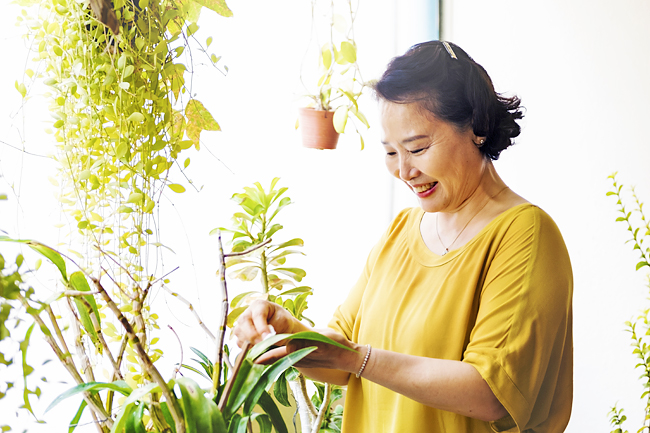Stacey Colino
THE WASHINGTON POST – Plants don’t interrupt when you’re speaking. They don’t argue or ask difficult questions. And regardless of whether they’re listening, research has shown them to be a calming presence. It’s no wonder, then, that so many of us talk to ours.
In a 2022 survey by Trees.com, 50 per cent of the 1,250 respondents reported talking to their plants and/or trees. When asked why 65 per cent said they believe it helps them grow.
The research, however, isn’t definitive about this point. While studies have found that vibrations caused by sound do affect plants, the jury’s still out on whether the human voice offers any specific benefit.
For many plant owners, though, the science is beside the point. Co-founder of the blog the Indoor Nursery Marquis Matson said she talks to her plants every day because “it feels nice… I think plants get a sense of community from my talking to them and that keeps them going”.
“One thing humans are good at is anthropomorphising – we talk to all kinds of things that aren’t human, like our dogs and cats,” said Professor of Psychology and Environmental Studies at Oberlin College in Ohio Cindy McPherson Frantz.

“We’re hardwired to project a sentient mind, intentionality, or feelings onto other beings or objects – and to want to connect to things outside ourselves. Plants can fulfil that need.”
On the plant side of the equation, a study in a 2003 issue of the journal Ultrasonics investigated the effects of classical music and the sounds of birds, insects and water on the growth of Chinese cabbage and cucumber. The conclusion is? Both forms of sound exposure increased the vegetables’ growth.
In a 2015 study published in the International Journal of Integrative Sciences, Innovation and Technology, researchers exposed marigold and chickpea plants to light Indian music as well as to traffic noise: They found that both types of plants grew and developed better – gaining increased height, a greater number of leaves, and a healthier look – after being exposed to the music for four hours per day, but not to the traffic sounds.
“Plants respond to vibrations in their environment – which can cause plants to grow differently and become more resistant to falling over,” said Professor of Environmental Sciences at the University of Toledo in Ohio Heidi Appel.
“Those vibrations can come from airborne sounds or insects moving on the plants themselves. And plants will respond differently to tones and music than to silence.”
Still, she pointed out, “While sound matters to plants, we don’t know if talking to them makes them grow differently.”
Despite the lack of studies and evidence about the benefits of talking to your plants, there is at least one theoretical perk, “If we identify with a living organism that we’re tasked with taking care of, we’re going to take better care of it,” Appel said.
For example, if talking to your plants helps you feel more connected to them, you might water, dust and prune them more regularly and take other measures to care for them and help them thrive.
Regardless of whether talking to the plants helps them, does it help us, as human beings? In that same 2022 Trees.com survey, 62 per cent of the participants who reported chatting up their greenery said they did so because it helped their mental health. They may have been onto something: Plenty of research shows that taking care of plants is beneficial to our well-being.
One study in a 2018 issue of the journal HortScience found that transplanting plants reduced mental stress and anxiety in young adults.
And regularly spending an hour gardening has been found to improve mood and reduce stress among healthy women, according to a study in a 2022 issue of PLoS One.
Stefan Bucur of Lewisville, Texas, said that he and his wife, Maegan, regularly talk to their plants. “Taking care of plants and interacting with them can be a mindful and calming practice, and talking to them enhances this experience,” said the founder and owner of Rhythm of the Home Bucur, a home improvement website. “In addition, talking to plants can help us practice gratitude and appreciation.”
While there isn’t published research on whether talking to plants is therapeutic for people, there are plausible reasons it might be, experts said. For one thing, it may come to us naturally.
“As humans, we often speak to what we’re caring for – it’s built-in,” said Psychotherapist with Northwest EcoTherapy in Eugene, Oregon Patricia Hasbach, and author of Grounded: A Guided Journal to Help You Reconnect with the Power of Nature – and Yourself. “It helps us be very present or mindful.”
For another thing, it can be a way of expressing thoughts and feelings out loud, to make sense of them.
“I think of talking to plants as a way of talking to ourselves,” said social worker and Director of the Stress Trauma and Resilience Programme at Ohio State University Kenneth
R Yeager. “As we’re talking to our plants, we’re talking to ourselves – and formalising our thought process.”
In other words, talking to the flora in your home can be a way of tuning in to the ways you talk to yourself (aka, your self-talk) and exploring how you’re thinking about something.
“Putting our thoughts and feelings into words is somewhat therapeutic,” Frantz said.
Talking to your plants is also a relatively low-risk proposition. “You might not want to do it in front of someone else,” said the Director of Therapeutic Horticulture at the Wilmot Botanical Gardens College of Medicine at the University of Florida Elizabeth Diehl.
However, when you talk to your plants, they are, quite literally, a captive audience. “Plants don’t judge,” Diehl said. “You can be who you want to be and say what you want to say – and they’re happy just for you to be taking care of them.”







